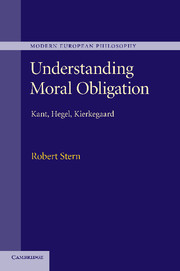Book contents
- Frontmatter
- Contents
- Acknowledgements
- References and abbreviations
- Introduction
- Part I Kant
- 1 Kant, moral realism, and the argument from autonomy
- 2 The argument from autonomy and the problem of moral obligation
- 3 Kant’s solution to the problem of moral obligation
- Part II Hegel
- Part III Kierkegaard
- Bibliography
- Index
3 - Kant’s solution to the problem of moral obligation
Published online by Cambridge University Press: 05 January 2012
- Frontmatter
- Contents
- Acknowledgements
- References and abbreviations
- Introduction
- Part I Kant
- 1 Kant, moral realism, and the argument from autonomy
- 2 The argument from autonomy and the problem of moral obligation
- 3 Kant’s solution to the problem of moral obligation
- Part II Hegel
- Part III Kierkegaard
- Bibliography
- Index
Summary
In the previous chapters, I have suggested that the focus of Kant’s concerns about autonomy was not value realism, but the account of moral obligation offered by the divine command theorist. In this chapter, I will consider what I take to be Kant’s alternative account, designed to avoid the objections he raised against the ‘theological concept’ of morality and so to offer a better solution to the problem of moral obligation. The key to Kant’s solution, I will suggest, is the contrast he draws between our will and a divine or holy will, where he takes it that the notion of obligation does not apply to the latter; in explaining why, he comes to his distinctive account of the obligatory force of morality as it applies to us, which differs markedly from what has gone before.
This is so, as we shall see, because while Kant’s account is opposed to the divine command approach to the problem, it is equally at odds with a more traditional natural law approach, while at the same time also combining elements of both. Having already discussed in the previous chapter what Kant objected to in the former, we may begin here by seeing what is problematic about the latter, and thus what intellectual pressures led Kant to adopt an alternative strategy, and thus to what I will call his ‘hybrid’ account.
- Type
- Chapter
- Information
- Understanding Moral ObligationKant, Hegel, Kierkegaard, pp. 68 - 100Publisher: Cambridge University PressPrint publication year: 2011

